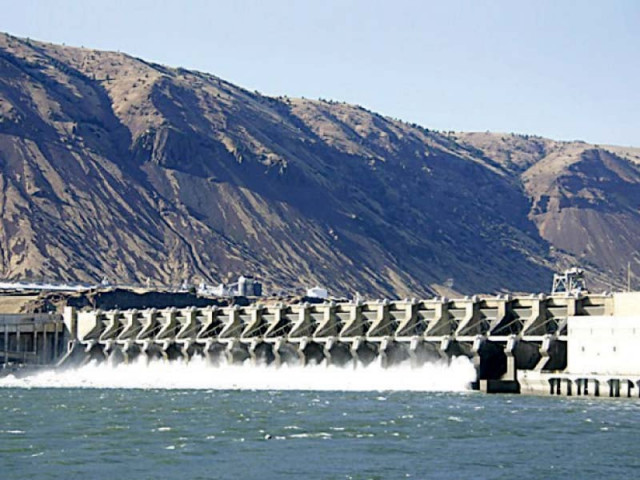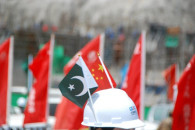All set: Funding resumes for Neelum Jhelum project
Islamic Development Bank and Saudi Fund for Development agree to give $433 million

During the first eleven months of the last fiscal year, the country received $159 million in loans for the project from China, IDB and Saudi Arabia. PHOTO: FILE
Putting an end to funding woes, Gulf lenders have agreed to resume financing for the 969-megawatt Neelum Jhelum hydropower project, addressing one of the major obstacles threatening its completion in the next year and a half.
The delegation of Islamic Development Bank (IDB) and Saudi Fund for Development announced their decision to resume $433 million funding during a meeting with Finance Minister Ishaq Dar that was held on Friday.
Read: Hydroelectric power plant: Financiers stop $433m loan for Neelum-Jhelum project
The project hit a snag after the financing gap widened to Rs200 billion, as the project has not yet achieved financial close. The $433 million or roughly Rs43 billion is part of the Rs200 billion gap.
 Finance Minister Ishaq Dar addressing the meeting on Friday as Minister for Water and Power Khawaja Asif looks on. PHOTO: PID
Finance Minister Ishaq Dar addressing the meeting on Friday as Minister for Water and Power Khawaja Asif looks on. PHOTO: PIDFederal Minister for Water and Power Khwaja Mohammad Asif and Minister of State for Water & Power, Abid Sher Ali also attended the meeting.
“It gives me great pleasure to announce that IDB and the co-financers on the project have agreed to continue funding of the Neelum Jehlum hydropower project,” said Finance Minister Dar. The project will be completed in the tenure of the current government and will prove to be a symbol of pride for the nation, he added.
Funding dilemma
The IDB had withheld $433 million loan because Pakistan was reluctant to seek performance guarantees from the project contractor, fearing that if it asked the contractor to provide guarantees against the additional cost, the contractor may take the authorities to court.
An official of Water and Power Development Authority (Wapda) claimed that the IDB and the Saudi Fund have accepted Pakistan’s demand of seeking performance guarantees from the contractor only to the extent of variation order.
He said the contractor will provide performance guarantees against Rs74 billion worth of work. The Chinese contractor has already provided Rs47 billion worth guarantees and now will submit additional guarantees valuing Rs27 billion, he added.
Read: Neelum Jhelum project: Govt rejects higher interest payments on Chinese loan
The cost of the project, which is currently under implementation, has soared from the earlier approved tag of Rs274 billion to Rs414 billion -up by Rs140 billion or 51%. Wapda decided to include all the cost in the revised PC-I of the project, which it had earlier suppressed to show the cost at the lower end.
During the first eleven months of the last fiscal year, the country received $159 million in loans for the project from China, IDB and Saudi Arabia. The government is also charging 10 paisa per unit surcharge on every unit utilised by the electricity consumers to arrange funds for the Neelum Jhelum project.
Chinese partnership
The issue of arranging additional $576 million loan from China has yet to be resolved. Beijing has already extended $448 million loan for the project. The government is also in process of arranging Rs100 billion loan from a consortium led by National Bank of Pakistan.
So far, Rs163 billion have been spent on civil works, acquiring land and provision of security.
The agreement with the IDB and other lenders was achieved during a sub-committee meeting. The government officials shared a plan on the progress of the project aimed at addressing the concerns of the financers on various matters and finally reached the consensus on the outstanding issues, according to a handout of the Ministry of Finance.
The Prime Minister in the Cabinet Committee on Energy meeting had handed over the responsibility of resolving financing and other related issues of the project to the Finance Minister.
The lenders also raised issues, which were delaying work on the project including problems on river crossing. One of the two tunnel boring machines is also out of order, which the government assured would be repaired in the next couple of months.
The energy specialist of the IDB Dr Farid Ahmad Khan said that the interest taken by government of Pakistan for early completion of this project was highly appreciated.
Published in The Express Tribune, July 11th, 2015.
Like Business on Facebook, follow @TribuneBiz on Twitter to stay informed and join in the conversation.


















COMMENTS
Comments are moderated and generally will be posted if they are on-topic and not abusive.
For more information, please see our Comments FAQ